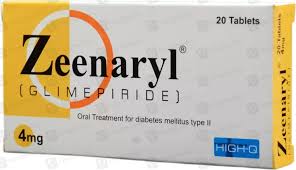Glimepiride is a medication used to treat type 2 diabetes by lowering high blood sugar levels. It belongs to the second-generation sulfonylurea class, which stimulates the pancreas to release insulin. Insulin facilitates the absorption of glucose, a sugar that provides energy to the body’s cells. Diabetes renders the body unable to produce or utilize insulin efficiently, resulting in high blood sugar levels.Glimepiride aids in the body’s response to insulin, further aiding in lowering blood sugar levels. This drug is usually administered alongside a healthy diet and regular exercise and may be used alone or in combination with other medications like metformin, sulfonylureas, or insulin. Due to the nuanced nature of diabetes, it is imperative to consult a healthcare professional before starting any medication. They can provide guidance on dosage and monitoring routines based on your specific needs.
Ingredients
GlimepirideDrug Class
Sulfonylurea
Dosage Form
TabletUses
Unveiling its multifaceted uses and transformative applications as follows:
- Lowering blood sugar levels in people with type 2 diabetes mellitus, but this should be done under the supervision of a licensed physician.
Dosage
Tailoring Treatment for Optimal Health, Prescribed Medication Dosage is:
- The standard starting dose of Glimepiride for managing type 2 diabetes is 1mg to 4mg once daily.
- It is usually prescribed to be taken before breakfast or with the first meal of the day.
- Glimepiride reaches its maximum effect within 1–2 hours after administration, and it has a half-life of around 2–4 hours.
- In case of any severe health issues, consult a doctor for the right dosage as you should not self-medicate.
In case of Overdose
Overdosing on glimepiride is a serious matter and warrants immediate medical attention. If you suspect someone has overdosed, it is crucial to contact your local emergency services or Poison Control Center right away. When speaking with the emergency services provider, be sure to provide as much information as possible, including the approximate amount taken, the time the overdose occurred, and whether any other substances or medications were taken concurrently.Upon arrival at a medical facility, the doctor or pharmacist will employ various treatments to address the overdose. This may include administering medications to induce vomiting or detoxify the system and providing supportive care, like intravenous fluids, to ensure close monitoring of vital signs.To ensure appropriate treatment, it is important to disclose any allergies or pre-existing health conditions to the medical providers. Informing them of any health-related history will allow them to tailor treatment and ensure the best possible care.
Missed Dose
If you have missed a dose of your medication, glimepiride, it is crucial to take it as soon as you can. If it is almost time for your subsequent scheduled dose, skipping the missed dose and returning to your typical dosing schedule is recommended. Overdosing can be hazardous, so do not double up on doses to make up for the missed one.Missed doses of glimepiride can increase blood sugar levels, which is especially problematic for individuals with diabetes. If you frequently miss doses, you may face severe health issues.If you have any concerns or need further advice on missing a glimepiride dose, contact your physician or pharmacist. They will provide you with more directed guidance.
How To Use
Before starting Glimepiride 4mg, it is important to review the medication guide provided by your pharmacist. This medication is designed to be taken orally, usually once daily with breakfast or the first meal of the day. It is essential to take each tablet with a full glass of water, whether food is consumed or not. Maintaining a consistent timing and taking the medication at the same time each day helps keep the drug levels in your bloodstream stable. Consequently, a fixed routine should be followed. It is important to refrain from crushing or chewing the tablets. In order to effectively incorporate Glimepiride into your routine, it is important to follow these intructions and carefully adhere to the guidelines on the medication label. If you have any questions, be sure to consult a healthcare professional for further clarification. Note that this medication’s dosage and timing may vary from person to person, depending on individual requirements and underlying medical conditions. Always follow the advice provided by your doctor or pharmacist to ensure safe and effective use. If you want more information about Glimepiride or any other diabetes medication, do not hesitate to ask!
When Not to Use
Discerning instances where this medication may not be appropriate:
- You are allergic to it or any of its ingredients. Past severe allergic reactions to this drug should be a warning to avoid it.
- You have low blood glucose or severe hypoglycemia.
- You have severe liver disease or alcoholism.
- You have severe kidney disease or are receiving treatment for kidney failure.
- You are allergic to peanuts or almonds as the medication contains a trace of these ingredients.
- You are pregnant, planning to become pregnant, or breastfeeding.
- You have any severe diseases or disorders of the kidneys, liver, heart, or blood vessels.
- You have metabolic acidosis.
- You are already taking medicine to treat diabetes.
- You have a history of drug or alcohol abuse.
- You are undergoing surgery or will be.
- If you have any of these conditions, you should not take Glimepiride 1mg.
Side Effects
Unraveling the side effects lurking behind this medications are as follows:
- Increased risk of fractures
- Increased risk of cardiovascular accidents
- Edema
- Weight gain
- Hypoglycemia
- Shakiness
- Headaches
- Dizziness
- Increased cholesterol
- Gastroparesis
- Diarrhea
- Constipation
- Increased appetite
Precautions & Warnings
Patients should exercise caution and consult a healthcare provider in the following scenarios:
- G6PD deficiency or stress-related states such as fever, trauma, infection, or surgery.
- Predisposition to hypoglycemia, including debilitated or malnourished individuals, those with inadequate caloric intake, or patients with uncompensated endocrine disorders affecting carbohydrate metabolism or counter-regulation of hypoglycemia, such as adrenal or pituitary impairment, or those who have undergone severe or prolonged exercise.
- Mild to moderate renal and hepatic impairment.
- Elderly individuals.
- During pregnancy and lactation.
Drug Interactions
Drug interactions with glimepiride include:
- Insulin (may increase risk of hypoglycemia- monitor blood glucose levels closely)
- Other antidiabetic agents (e.g., metformin) (may increase risk of hypoglycemia- adjust doses as needed)
- CYP2C9 inhibitors (e.g., fluconazole) (may increase glimepiride levels- monitor for increased hypoglycemia)
- CYP2C9 inducers (e.g., rifampin) (may decrease glimepiride levels- monitor for reduced efficacy)
- Diuretics (e.g., furosemide) (may alter blood glucose levels- monitor blood glucose levels closely)
- Corticosteroids (e.g., prednisone) (may increase blood glucose levels- monitor blood glucose levels closely)
- Beta-blockers (e.g., propranolol) (may mask symptoms of hypoglycemia- monitor blood glucose levels closely)
- Alcohol (may enhance or diminish hypoglycemic effects- monitor blood glucose levels closely)
- Anticoagulants (e.g., warfarin) (may alter bleeding risk- monitor INR closely)
Storage/Disposal
Glimepiride is a drug that should be stored in a room temperature environment, away from any heat source and direct light. The medication label should be adhered to and if you have any questions regarding storage you should confer with a healthcare professional. You should ensure that the medication is kept out of reach of children and pets and also avoid freezing or placing the medication in direct sunlight.
Laboratory Screening
In order to track any abnormalities and ensure your body tolerates the medication properly, a complete blood count (CBC) will be performed to examine components of your blood such as red and white blood cells and platelets. A comprehensive metabolic panel (CMP) will likewise measure other important factors such as blood sugar, cholesterol, and kidney function. Given that diabetes commonly affects these levels, it is important to ensure the medication is not causing further negative effects on them. Maintaining these levels within a healthy range can help you avoid complications related to your diabetes and it is therefore important to discuss the results of these tests with your doctor to make sure your treatment plan is effective.


Get Your Healthcare Delivered Nationwide!
No matter where you reside in Pakistan, medlife.pk brings your healthcare essentials straight to your doorstep! We partner with trusted shipping companies like TCS, M&P, LEOPARD Courier, Trax, and Call Courier for nationwide delivery.
For ultimate convenience, enjoy Cash on Delivery (COD) with a flat rate of Rs.299 across Pakistan. Prefer to pay upfront? Orders over Rs.3,000 receive free shipping when you pay with Bank Transfer, JazzCash, Easypaisa, or Credit/Debit Card. And the perks don't stop there! Orders exceeding Rs.5,000 with advance payment not only get free shipping, but also earn you a discount coupon for your next medlife.pk purchase.
Rest assured, our team meticulously packs and ships your order for safe arrival, ensuring you receive the genuine products you deserve. So, browse our selection, choose your payment method, and get ready to experience the medlife.pk difference! Happy shopping!




















Reviews
There are no reviews yet.